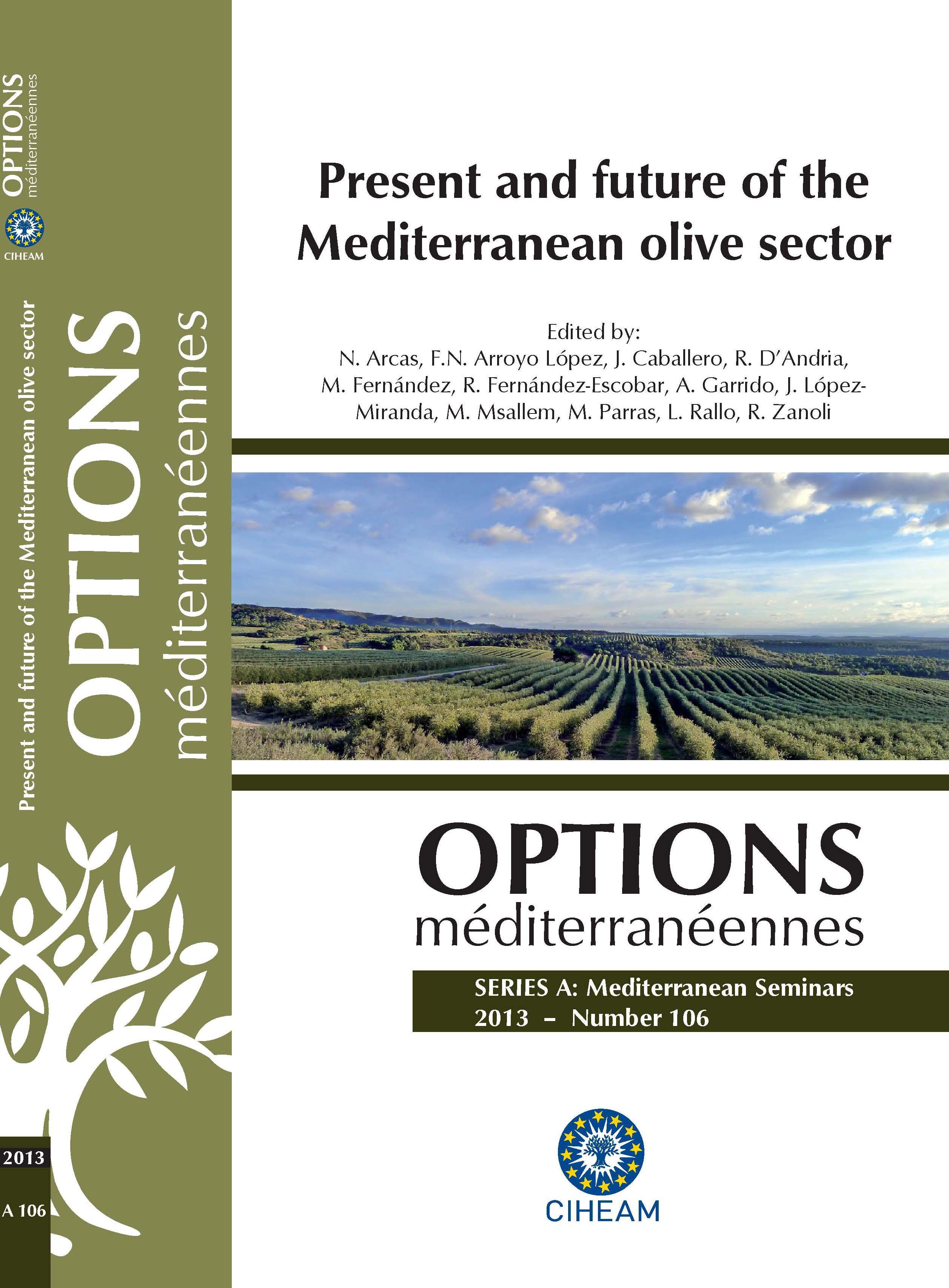| Article précédent | p. 171-177 | Article suivant |
Table olives: a natural source of health-promoting bioactive nutrients and probiotics
A new generation of natural and healthy foods has been on the rise – and fermented olives are part of that new trend. Concerted public health policies triggered by budgetary restrictions will require investment on prevention rather than bearing – especially as the human life expectancy is becoming longer and longer; and the aforementioned types of foods are nuclear vectors of this strategy as applied to the Mediterranean countries. Some of the components of the olive fruit may by itself function as prebiotics, viz. dietary fibers (with beneficial effects toward prevention of several pathologies), besides such nutraceuticals as essential fatty acids (with anti-cancer features) and antioxidant sterols, polyphenols and glycosides (with general anti-ageing activities). Moreover, some of the adventitious lactic acid bacteria of table olives apparently can survive passage through the gastrointestinal tract – and fully i.e. they resist digestion and even survive in the gut, so they have a chance to act against pathogens installed therein ward showing probiotic capacities. Production of fermented olives with selected (wild) probiotic bacteria therefore constitutes indeed a new avenue to enrichment of the existing olive-based product portfolio, by generating a new food containing probiotics aimed at improving consumers’ health without hampering its original sensory characteristics of that have accounted for their success so far.
Une nouvelle génération d'aliments naturels et sains est à la hausse - et les olives fermentées en font clairement partie. Suite aux politiques de santé publique concertées visant à faire face efficacement aux restrictions budgétaires, il faudra investir sur les approches de santé préventives - d'autant plus que l'espérance de vie humaine s'allonge ; et les types d'aliments mentionnés ci-dessus sont des vecteurs essentiels pour cette stratégie appliquée dans le bassin méditerranéen. Les olives de table traditionnelles semblent un produit cible ayant un bon potentiel pour la promotion de la santé ; les composants du fruit peuvent aussi agir comme prébiotiques, à savoir, les fibres alimentaires (ayant des effets bénéfiques en matière de prévention de pathologies humaines), outre les produits nutraceutiques tels que les acides gras essentiels (avec activité anticancéreuse) et les antioxydants tels que stérols, polyphénols et glucosides (avec activités antivieillissement). En outre, certaines bactéries lactiques indigènes des olives de table peuvent survivre au passage dans le tractus gastro-intestinal - résistant ainsi à la digestion, et pouvant en conséquence agir contre les agents pathogènes qui y sont installés, montrant ainsi un potentiel probiotique. La production d'olives fermentées par des bactéries probiotiques sélectionnées (indigènes) constitue en effet une nouvelle voie pour enrichir le portefeuille de produits à base d'olives et permettre d'obtenir un nouvel aliment contenant des probiotiques pour améliorer la santé des consommateurs, sans pour autant entraver les caractéristiques sensorielles des olives fermentées.
- [ Afficher ]
- [ Télécharger ]
- [ Exporter la citation ]
Vous pouvez télécharger la citation au format :
- [ Imprimer ]
-
Mots-clés
ALIMENT SANTE POUR HOMME, OLIVE, PROBIOTIQUE, PROPRIETE BIOLOGIQUECiter cet article
Peres C., Peres C.M., Moreira L., Alves M., Maricato J., Xavier Malcata F. Table olives: a natural source of health-promoting bioactive nutrients and probiotics. In : Arcas N. (ed.), Arroyo López F.N. (ed.), Caballero J. (ed.), D'Andria R. (ed.), Fernández M. (ed.), Fernandez Escobar R. (ed.), Garrido A. (ed.), López-Miranda J. (ed.), Msallem M. (ed.), Parras M. (ed.), Rallo L. (ed.), Zanoli R. (ed.). Present and future of the Mediterranean olive sector . Zaragoza: CIHEAM / IOC, 2013. p. 171-177. (Options Méditerranéennes : Série A. Séminaires Méditerranéens; n. 106). International Seminar: Present and Future of the Mediterranean Olive Sector, 2012/11/26-28, Zaragoza (Spain). http://om.ciheam.org/om/pdf/a106/00006816.pdf



